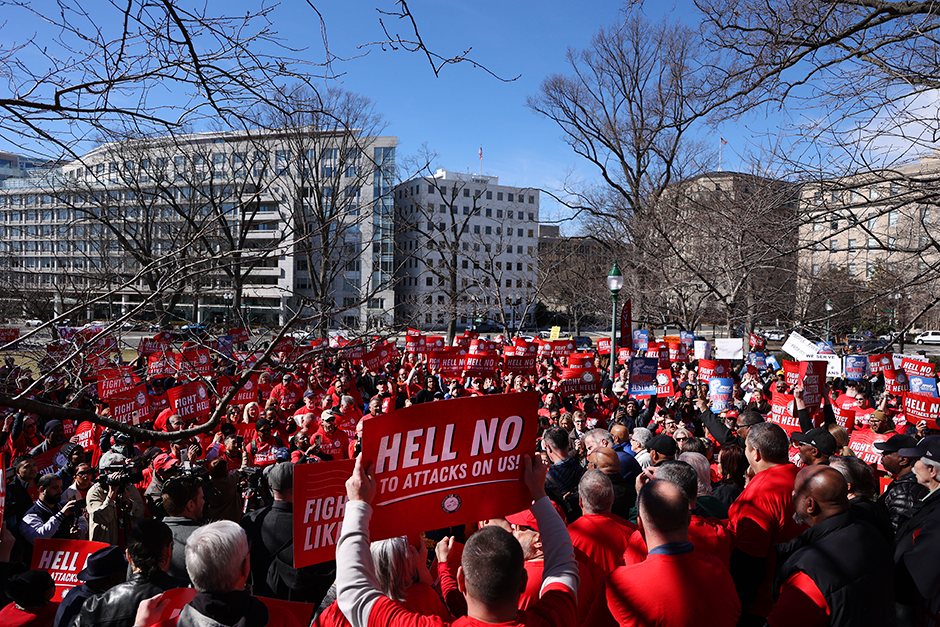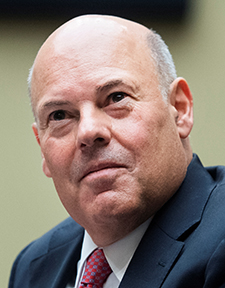


WASHINGTON — The U.S. Postal Service, which has been in dire financial straits, could soon be sold to the highest bidder and unions representing postal workers are mobilizing to insist “the U.S. mail is not for sale.”
Organized by the American Postal Workers Union, letter carriers and other postal employees plan to hold two rallies in Minnesota on Thursday — in Minneapolis and Duluth — as part of an effort in 150 cities to protest the specter that the Trump administration will sell the USPS, which they said would sharply raise rates and shutter post offices.
Postmaster General Louis DeJoy offered postal workers a voluntary plan to take early retirement, a buyout negotiated with postal unions, in December.

In a recent letter to Congress, DeJoy said the buyout would result in a reduction of 10,000 workers over the next month and billions of dollars in savings.
But that’s not what has prompted the protests slated for Thursday — or others that have been planned in the next weeks by other labor unions who represent USPS employees.
It’s President Donald Trump’s plans for the postal service that have touched off the protests and rallies.
Trump, who has said at times that the USPS should be privatized, said last month that he may put the now-independent service under the control of the Commerce Department in what would be an executive branch takeover.
To the unions representing postal workers, this would be the first step in an effort to sell the USPS, a 250-year-old institution that since 1970 has been operating as an independent agency of the federal government.
“Who knows what the ultimate goal is,” said Don Maston, president of the National Rural Letter Carriers Association (NRLCA,) which represents more than 2,500 postal workers in Minnesota.
Trump has said that since the Commerce Department is in charge of the U.S. Census that is taken every 10 years, it makes sense for the agency to also oversee the post office that handles the delivery and return of U.S. Census Bureau forms.
But Maston said “it makes no sense” to put the USPS, with its more than 640,000 employees, under the administration of the Commerce Department, which has about 40,000 employees, unless the plan is to sell the postal service.
“It’s just not a very well-thought-out plan,” Maston said.
To American Postal Workers Union President Mark Dimondstein, the USPS is bound by its promise to provide service to all Americans at the same cost. And he says that promise is under threat.
“If this administration succeeds in taking over the USPS, it will lead to higher prices and reduced service, especially in rural areas,” he said.
Diamondstein said he believes a possible reason Trump is considering selling the USPS is to benefit Wall Street investors. He points to a Wells Fargo analysis that said the sale would boost the fortunes — and stock price — of the postal service’s private competitors, FedEx and United Parcel Service (UPS.)
“So, the only explanation is that those who are pushing the privatization are the investors on Wall Street,” he said.
The perceived threats to the USPS have united the four main unions that represent postal employees, which besides the APWU and the NRLCA include the National Association of Letter Carriers and the National Postal Mail Handlers Union. They are all supporting one another’s rallies and are all involved in lobbying campaigns to try to head off the sale of the USPS.
“An attack on one is an attack on all,” Maston said.
‘These are not normal times’
As an independent agency, the USPS has been largely self-funded by the sale of stamps and charges for packages and services, not taxes.
But a shift from “snail mail” to communications, advertising and payment of bills online — coupled with the death of many print publications — plunged the USPS into financial troubles.
Since only Congress is authorized to change the structure of the USPS, unions representing postal workers are lobbying federal lawmakers. Maston said there’s support for the USPS on both sides of the aisle since many GOP lawmakers represent rural districts that are heavily dependent on the service.
He said if rural residents are forced to depend on a private company for mail and package delivery “they will have to pay much, much more” for those services. And he said many rural residents may lose their delivery service, having to drive “30 or 40 miles” to the nearest post office to pick up mail and packages.
Diamondstein said the fate of USPS “should fall to Congress, but who knows what Congress will do.”
So he said he wants to inform USPS customers about threats to their mail service and that’s why the unions have planned a series of rallies.
“These are not normal times so the people of the country have to be informed,” Diamondstein said.
Postal unions are also concerned that DeJoy has signed an agreement to work with Elon Musk’s Department of Government Efficiency in downsizing the USPS.
“DOGE has been looking into the postal service and we have issues with Elon Musk” because of the billionaire’s role in the mass firing of federal workers and dismantling federal agencies.
Maston said he and other union officials, as well as members of Congress, have asked for a copy of the agreement DeJoy signed with Musk. It has not been forthcoming, he said.
‘DOGE may not be done’
DeJoy was a wealthy Trump mega-donor who was appointed postmaster general during the president’s first term in office.
He initially raised concern among Democrats with his proposed changes to the USPS, which included cutting mail delivery from six days a week to five.
But he won the respect of the nation’s postal unions by, in the end, keeping six-day mail service and for his support for legislation signed into law by President Biden that eliminated a mandate that postal service retiree health plans be pre-funded, giving the financially shaky USPS a $57 billion boost.
In his recent letter to Congress, DeJoy, who has notified the USPS Board of Governors that he plans to step down, said “approximately half of our current Post Offices fail to cover their cost of local operations” and promised a review of “our leases on almost 31,000 retail centers.”
He also asked Congress to help in other ways, including an end to unfunded mandates, permission to invest the USPS pension fund in the stock market and money for new technology to detect counterfeit postage.
“These are the only initiatives that I have requested and authorized the DOGE team to assist on thus far, and only the data and information required to pursue these initiatives will be provided to the DOGE team members,” DeJoy wrote.
DOGE did not return requests for comment

Rep. Angie Craig, D-2nd District, who has waged her own battle against DeJoy’s policies after receiving an avalanche of complaints of no mail or slow mail, is highly skeptical that the downsizing of the postal service will be limited to 10,000 buyouts.
“DOGE may not be done with the postal service yet,” she said.
She said even a small decrease in the number of postal employees will hurt service in Minnesota, which she said continues to be plagued by poor delivery service.
A USPS Office of Inspector General report released earlier this month showed that only 79% of the mail delivered in Minnesota met the USPS’s two-day standard, ranking the state 38th in the country for on-time delivery. The USPS goal is for 87% of the mail to be delivered within two days.
Like the postal unions, Craig is convinced the Trump administration wants to sell the USPS and signed a letter to Trump with 158 other lawmakers that protested the administration’s plan to fire the USPS Board of Governors and merge the Postal Service with the Department of Commerce.
“Any attempts to privatize the Postal Service would be a betrayal to the more than 640,000 postal employees who work tirelessly every day to ensure mail is delivered to every corner of the country,” the lawmakers wrote. “It would also hurt American consumers and businesses who rely on the Postal Service daily for mail and package delivery.”

Ana Radelat
Ana Radelat is MinnPost’s Washington, D.C. correspondent. You can reach her at aradelat@minnpost.com or follow her on Twitter at @radelat.
The post Postal workers rally to raise alarm about Trump plans to privatize postal service appeared first on MinnPost.

















































